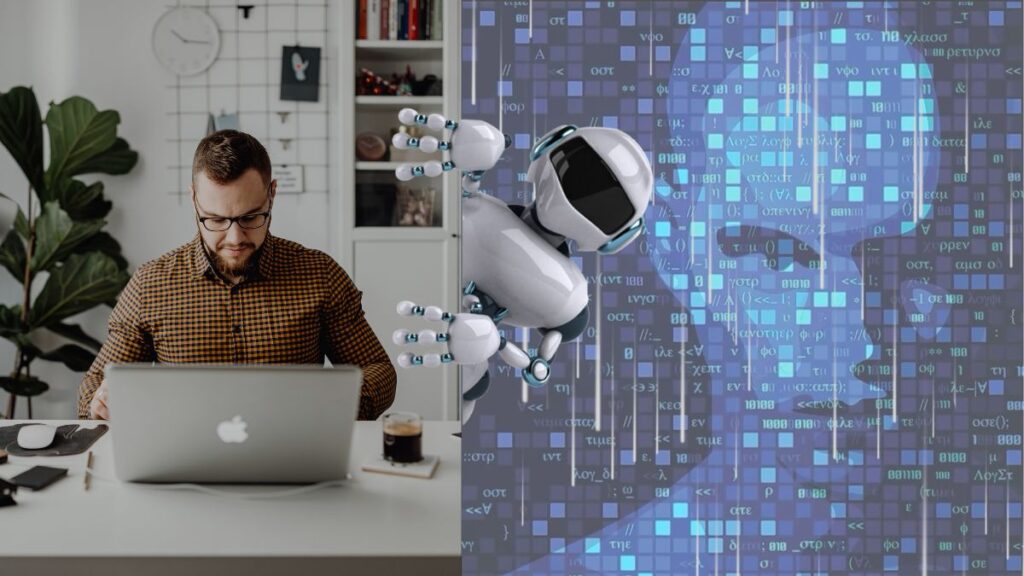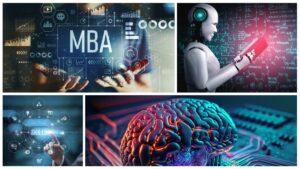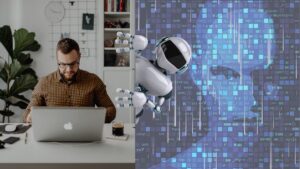Are you worried about the impact of AI on your job? You are not alone and this is what you should do

The impact of AI on job market is real and one needs to adapt quickly to stay relevant
Artificial Intelligence or AI as we all know it has taken the world by storm. Our workplaces, our cars, homes, gadgets and entertainment, everything has been taken over by AI. Artificial Intelligence is easy to integrate and it learns quickly to perform most of the tasks considered to be human domain with ease. In addition to that, AI makes fewer mistakes, works silently and consumes only a fraction of resources in comparison to its human counterparts to accomplish any assignment. In this article, we shall understand the impact of AI on your job and what you can do to stay relevant to your employer.
Consequently, AI is replacing humans in every career faster than one can imagine. It is taking over jobs at a faster pace than it creates. The future is written on the wall. On one side, it is inevitable to stop AI from taking over our jobs and on the other, it is important for everyone to be ready and skilled for the jobs AI will create.
Artificial Intelligence can read data, analyze it and make informed decisions. It has the capability of evolving fast. This makes it suitable both, for performing tasks as technical as writing software codes to tasks that require evaluation and decision making in general management roles. This points to a disturbing/promising possibilities in the sense that AI can do both quantitative and qualitative tasks with equal ease.
Sectors at the Risk of Being Taken Over by AI
In order to understand the impact of AI on your job, it is important to first understand which sectors are going to be affected by AI:
Banking, Financial Services and Insurance (BFSI): AI can easily handle large volumes of data, accounting and book keeping, fraud detection and control and customer facing functions.
Media and Marketing: AI is best at content creation and this strength is being actively leveraged in conceiving and executing marketing campaigns, analyzing customer data to gain customer insights and to launch and manage digital advertising campaigns.
Legal Services: Automation can easily understand the legal framework and create a repertoire of knowledge for future reference. It do document review, read contracts and identify legal options available to a client. This relieves many entry level positions in this sector.
Manufacturing: This sector has been completely swept by AI, as it can design, control complex processes and monitor quality all the same time. Manufacturing will loose many jobs including those of product designers, plant operators and quality inspectors.
Learning & Development: For students and trainees, AI can create tailored learning schedules based on the learning requirements and the learning capabilities of the students. AI can search the Internet and create personalized courses for anything one wishes to learn. This will, to a large extent eliminate the need for instructors and teachers.
Defense and Law Enforcement: Using inward data from radars, cameras and sensors, AI can quickly gain complete mental map of the situation and take proactive and reactive actions, much faster than humans.
Jobs At Risk of Being Replaced by AI
Content Creators: Though currently, most search engines, universities and scholarly publications discourage AI generated content but it is not going to last forever. It is not that the content creators like writers, bloggers and students can create content using AI and pass it off, rather, the content consumers will directly ask AI to create whatever content they wish to consume. For example, if you wish to read anything on child psychology for parenting, instead of having read many books or articles or attending parenting classes, you could simply ask AI to give you lessons on child psychology for a child of a specific age, gender, society and cultural background.
Customer Services: Most of the banks, airlines, and hotels etc. have already started deploying AI based Chatbots that are able to handle over 90% of the customer functions. Mind you, these Chatbots are different from those robotic Chatbots that had very limited responses. AI based Chatbots can be sensitive, evolving and may have human-like decision making capability. It all depends how much autonomy their masters have given them.
Trainers and Teachers: Not all but many basic jobs in these areas will be taken over by AI. Basic courses, examinations and evaluations and feedback are some activities that are being already taken over by AI.
Healthcare Jobs: Basic evaluation of diagnosis and suggesting future course of treatment is something that can be easily taken over by AI and it has happening around us faster than we can imagine.
Legal Services: AI can read contracts, identify loopholes and create contracts once they are taught the law of any place.
Drivers: Autonomous vehicle technologies threaten jobs related to driving.
Computer Operators: Data entry jobs, answering emails, typing and content creation, editing are some of the areas where AI has already made deep inroads.
Software Developers: Even programming tasks can be automated to some extent with AI, though more complex tasks still require a human touch.
Project Managers: Project management is a highly quantitative job and it is carried out with a lot of charts, scheduling models and monitoring tools, all of which can be taught to an AI model and it will do a better job than humans due to less probability of erring.
Sales and Marketing: Creating sales pitches, designing and executing campaigns, analyzing customer behavior using data and monitoring and reporting sales performance is something even basic CRM tools without AI have already been doing. With AI these functions will only become better, cheaper and easier.
Accountants: Accounting and book keeping that is already automated to a large extent stand the greatest risk of being pummeled by the advancing feet of AI.
If you happen to be doing one of the above jobs, the impact of AI on your job will be felt sooner than others.
How to Remain Relevant in the AI-Driven Job Market
In rapidly changing paradigm, it is important to remain relevant in the job market and reduce the impact of AI on your job. Employers will replace human jobs with AI where ever possible, no doubts about that because, AI is cheaper, easier to manage and has a much steeper learning curve than their human peers.
So instead of fretting and fuming, let us be forward looking, accept and embrace this change. By doing so, we are ready to reskill and upskill to remain relevant in the fast emerging AI-driver job market.
Here a few things you can do to stay relevant in GenAI era:
Educate and Update Yourself: Learn to use AI. Go beyond ChatGPT to explore the capabilities of generative AI. It is important to realize the generative AI goes way beyond the capabilities of ChatGPT and generative AI tools can accomplish much more than just writing text. Generative AI can be used to draw, create audio, music, images and video, besides being able to write a computer code.
Assess Your Replaceability by AI: Understand the capabilities of generative AI and then evaluate how much part of your job role can be replaced by AI. Not all functions can be replaced by AI, for example qualitative human functions such as team management, motivation leadership and on-the-spot decision making cannot be taken over by AI, as of now. Try to find out how much of your job has the risk of exposure to AI and accordingly decide whether you are in the high risk category or not. If yes, then you must start planning for alternative professions or skills.
Master Generative AI: Speaking at the 2023 World Economic Forum’s Growth Summit, economist Richard Baldwin said, “AI won’t take your job. It’s somebody using AI that will take your job.” This means that if you don’t know how to work with AI, you’re in a much riskier position—certainly compared to someone who embraces AI and knows how to use it to do their job more effectively. So if you find yourself in the high-risk category, then follow this principle, “If you can’t beat them, join them”. By doing so, you will equip yourself with the skills and the competencies required to work with AI or using AI to fill the new job openings that will come up for AI professionals. Remember AI will take away some jobs but will always create new jobs (just like computers did in the 90s) and you should be ready to hop on the bus.
Identify and Develop More Human-Centric Skills: If AI adoption and upskilling in the field of AI does not excite you, then you can explore developing yourself in areas where AI cannot replace humans, for now.
Areas like creativity, complex decision making, strategic thinking, leadership, empathy, interpersonal relationships and so on are at a lesser risk of being taken over by AI. These are the areas where humans will continue to have the edge over machines.
Embrace Change: ‘Change Before Change Changes You’ – Always remember this mantra. The cliched saying, “Chance is the only constant in the world” will always hold good. Be ready to accept the new realties, new workplace cultures and the changing paradigms. Learning and upskilling is a constant practice and one has to identify potential changes that can disrupt life, adopt them and adapt yourself to stay relevant always. However it has be done while it is still time and not later as it may be too late. Remember to repair the roof of your house when it is sunny and not when it has started raining.
ALSO READ | Want To Be Your Own Boss? A Step-By-Step Guide That Helps You To Be Successfully Self-Employed
Emerging Job Opportunities with AI
Prompt Engineering: Artificial Intelligence, like a child needs to be taught, monitored and corrected and just like a child, we need to tell AI what to do. This is called AI prompt engineering. This discipline deals with working closely with an AI model, trying out different commands to see which commands get the AI model to produce the desired results. Learning to understand the behavior and reaction of various AI models and then creating tailored commands to accomplish simple and complex task is at the core of prompt engineering. This is in great demand these days.
AI Ethicist: Artificial Intelligence may have evolved a great deal but it still needs to be constantly trained and adapted to different cultures just like raising a child in a particular culture. An AI ethicist will teach the AI model about what is ethically acceptable or not in the culture it is being raised for. An AI ethicist will mentor the AI model to behave like a good citizen in the society.
AI Trainer: The job of an AI trainer is to train an AI model to perform as expected in terms of qualitative and quantitative outputs of a job. For example, in manufacturing, AI needs to be trained on error tolerances, timelines and accuracy requirements. This is achieved by providing feedback to the AI model alongside while it is learning to master a particular task.
AI Auditor: An AI auditor constantly monitors the performance of AI to ensure it complies with the legal and ethical standards. At the same time, an AI auditor may also monitor the AI outcome to evaluate its performance against the benchmarks.
Machine Managers: These are the resources that monitor the operation of AI-based systems to ensure proper functionality and performance.
Impact of AI on Your Job
Remember AI is here to stay and takeover our workplaces, simply because it is easier to manage, costs less and is not governed by labor laws. This makes incorporation of AI and replacement of humans by AI an attractive choice for companies. Especially smaller companies and startups will leverage the advantages of AI to stay lean and competitive.
However, the situation is not all that gloomy as it appears. To minimize the impact of AI on your job, all that is required is to accept the inevitable, prepare for the change, by acquiring the necessary skills to stay relevant alongside AI and keep evolving. This will reduce the impact of AI on your job. Those who will try to resist the implementation of AI will face a similar situation that many faced when computers were taking over the manual jobs in various sectors – banking for one example!









